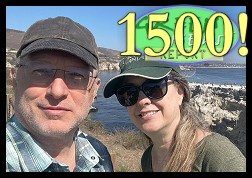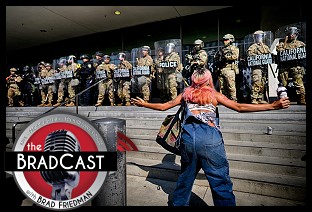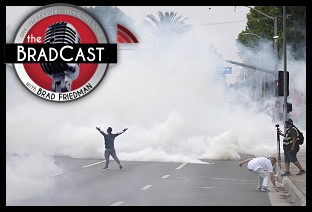


TWITTER: @GreenNewsReport
VIA SMART PHONE: Stitcher Radio!
IN TODAY'S RADIO REPORT: The Planet strikes back in 2010 --- and packs a winter wallop; More Wikileaks: sneaky moves on biotech crops and climate negotiations; Evangelical Christianity's War on Environmentalists begins; PLUS: Which is better --- real or fake? Christmas trees, we're talking about Christmas trees! .... All that and more in today's Green News Report!
Got comments, tips, love letters, hate mail? Drop us a line at GreenNews@BradBlog.com or right here at the comments link below. All GNRs are always archived at GreenNews.BradBlog.com.
IN 'GREEN NEWS EXTRA' (see links below): Carcinogen found in drinking water of 31 U.S. cities; Ocean acidification may disrupt the marine nitrogen cycle; GM launches new electric hybrid car in US; New federal efforts to control Asian Carp insufficient: states; 'Shark finning' ban passes House; CA to launch cap-and-trade system; Investigative Jounalist Greg Palast, busted by BP in Azerbaijan; EPA ethanol move slammed by auto, boat manufacturers; Mexico oil pipeline blast kills at least 28; Toxicologist says LA seafood may not be safe for children ... PLUS: The Science of Cities: the future or a dead end? ....
STORIES DISCUSSED IN TODAY'S 'GREEN NEWS REPORT'...
- 2010: The Year the Planet Struck Back, and Packed a Wacky Winter Weather Wallop for the Northern Hemisphere:
- 2010's world gone wild: Quakes, floods, blizzards (AP) [emphasis added]:
This was the year the Earth struck back.Earthquakes, heat waves, floods, volcanoes, super typhoons, blizzards, landslides and droughts killed at least a quarter million people in 2010 — the deadliest year in more than a generation. More people were killed worldwide by natural disasters this year than have been killed in terrorism attacks in the past 40 years combined.
"It just seemed like it was back-to-back and it came in waves," said Craig Fugate, who heads the U.S. Federal Emergency Management Agency. It handled a record number of disasters in 2010.
"The term '100-year event' really lost its meaning this year."
And we have ourselves to blame most of the time, scientists and disaster experts say. Even though many catastrophes have the ring of random chance, the hand of man made this a particularly deadly, costly, extreme and weird year for everything from wild weather to earthquakes.
- That snow outside is what global warming looks like: Unusually cold winters may make you think scientists have got it all wrong. But the data reveal a chilling truth (Guardian UK)
- Storm hits California with heavy rain, high winds (AP)
- Europe weather: EU brands snow-hit airports 'weak link' (BBC):
BBC Stephen Evans: "The effect of the great European freeze is now being felt in airports from New York to Hong Kong."The EU has heavily criticised European airports for failing to deal with recent freezing weather, which has left thousands of travellers stranded.
European transport commissioner Siim Kallas urged airports to "get serious" about planning, and labelled them a "weak link" in the infrastructure.
- Snow disrupts travel across northern Europe (BBC)
- Cold weather turns UK gas demand up to record levels (Guardian UK):
Britain's gas system is under unprecedented pressure after cold weather pushed demand to a new record today. - Chinese endure power shortages as coal runs short (Washington Post)
- Eastern Arctic warming trend alarms scientists: "We have dramatic changes taking place" (Nunastsiaq Online):
You might think of scientists as calm and cool.But the first three presenters during the opening session of the three-day ArcticNet conference in Ottawa sounded alarmed by the increasingly visible signs of Arctic warming and the limited amount of money that Canada will spend to understand what's happening.
..
The most "unusual things [are] going on in the winter," Wohlleben said. Nothing is progressing as it used to, she said, listing a string of peculiar happenings:• air temperatures 20 C above normal at the beginning of the year in the Baffin Island communities of Clyde River and Qikiqtarjuaq;
• large ice cracks south of Resolute Bay last January, which caused a hunter to float off on an ice floe;
• and other cracks in land-fast ice spreading throughout the High Arctic islands, endangering research stations, causing problems for polar trekkers and swallowing up a Twin Otter.
- Evangelical Christian Group Launches New Salvo in War on Environmentalists:
- Beware the Treehuggers! (VIDEO) (Mother Jones):
Just in time for the holidays, a coalition of Christian conservative groups has issued an "explosive new 12-part DVD series" detailing the dangers of environmentalism. "Resisting the Green Dragon" explains how caring about future of the natural world is really an attempt to "push evangelicals to embrace anti-Christian environmental views." - Remember When Cap and Trade Was a GOP Idea? (Kate Sheppard) [empahsis added]:
It might have been hard to tell during the past few years, with Republican opponents branding all attempts to cut greenhouse gas emissions "cap and tax," but the idea of capping emmissions and trading emission permits was originally a GOP idea introduced to deal with acid rain. On Monday, the Environmental Protection Agency released a report celebrating the 15-year-old program to curb acid rain as an environmental (and economic) success.
...
Moreover, the EPA reports, the program has saved $120 billion in public health costs, which is about 40 times what it cost to implement the program. The EPA concludes that the program's success in cutting fine particle pollution has saved 20,000 to 50,000 lives per year. - Off The Rails: The Year In Fox News Misinformation (MediaMatters.org)
- In Contrast: How parents keep the faith: Mandate a moral code, not theology: For the Unitarian Parker parents, to keep the faith is to offer a universal moral code and let the child pick theology. (Christian Science Monitor)
- More Revelations from Wikilieaks:
- WikiLeaks: Hackers tried to infiltrate U.S. climate negotiators (Wonk Room):
A diplomatic cable published by WikiLeaks reveals that hackers launched a sophisticated attack against United States climate negotiators about the same time the Climategate hacking of scientists happened last year. The attack, a “spear phishing” attempt to gain control of Department of State (DoS) computers, took place in the months before the Copenhagen climate talks of December, 2009. - US threatened ‘retaliation’ to bully EU into accepting biotech crops, cable shows (Raw Story) [emphasis added]:
Reacting to a French pledge to represent the "common interest" in considering biotech foods, a former US ambassador recommended publishing a "retaliation list" of European locations where genetically modified organisms (GMOs) were being grown in hopes that activists would destroy them and "cause some pain" for officials, a leaked diplomatic cable shows.
...
The document would appear to expose a high-ranking US official advocating a selective leak of otherwise confidential information to achieve a European political objective on behalf of US private industry. - Is the Wikileaks Saga the Biggest Crypto-Environmental Story of 2010? (Treehugger)
- WikiLeaks cables: BP suffered blowout on Azerbaijan gas platform (Guardian UK)
- Wikileaks Reveals Hushed Concern Over Tar Sands in US State Dept (Treehugger)
- Wikileaks: Dalai Lama Says Tibet's Environmental Problems Cannot Wait, But Political Solution Can (Treehugger)
- Wikileaks Reveals Shell Oil Has Agents Installed in Nigerian Government (Treehugger)
- Wikileaks Cables Show US Pressured Saudi Arabia to Back Copenhagen Accord, and More (Treehugger)
- What's Better for the Environment?: Real vs. Fake Christmas Trees:
- How Green Is Your Artificial Christmas Tree? You Might Be Surprised (NYT Green):
In the most definitive study of the perennial real vs. fake question, an environmental consulting firm in Montreal found that an artificial tree would have to be reused for more than 20 years to be greener than buying a fresh-cut tree annually. The calculations included greenhouse gas emissions, use of resources and human health impacts.
...
The annual carbon emissions associated with using a real tree every year were just one-third of those created by an artificial tree over a typical six-year lifespan. Most fake trees also contain polyvinyl chloride, or PVC, which produces carcinogens during manufacturing and disposal. - World's Most Wasteful Christmas Tree is...Too Wasteful (Treehugger)
'GREEN NEWS EXTRA' (Stuff we didn't have time for in today's audio report)...
- Probable carcinogen hexavalent chromium found in drinking water of 31 U.S. cities (Washington Post):
An environmental group that analyzed the drinking water in 35 cities across the United States, including Bethesda and Washington, found that most contained hexavalent chromium, a probable carcinogen that was made famous by the film "Erin Brockovich."The study, which will be released Monday by the Environmental Working Group, is the first nationwide analysis of hexavalent chromium in drinking water to be made public.
- Ocean acidification may disrupt the marine nitrogen cycle (Scientific American):
Scientists already know that a drop in ocean pH affects the carbon cycle, reducing the carbonate ions that organisms like corals, mollusks and crustaceans use to build shells and external skeletons. Now, a new study shows that a CO2-induced increase in acidity also appears to disrupt the marine nitrogen cycle. The finding, to be published December 21 in the Proceedings of the National Academy of Sciences, could have ramifications for the entire ocean food web. - General Motors launches new electric hybrid car in US (Guardian UK):
"We drove it a lot," he said. "The car was on all day. It was after 2 o'clock when I was finished for the day and I looked down and it had half a battery to go. It was doing fine."Impressed by the test run, Kaffee, who is now an estate agent, decided to make the car his main commuting vehicle.
- Asian carp: Midwest states welcome new US efforts --- but still want more (Christian Science Monitor)"
The Obama administration has announced 13 additional measures to address concerns about a potential Asian carp migration. But many Midwest states are demanding a permanent barrier to separate the Mississippi River from Lake Michigan. - Shark finning ban bill passes House, headed to Obama's desk (The Hill)
- California air regulators approve carbon-trading plan (LA Times):
The cap-and-trade system will limit emissions from 600 major industrial plants in the state, starting in 2012. Firms could buy pollution offsets from timber companies that preserve carbon in forests.
...
Gov. Arnold Schwarzenegger, a champion of a market-based approach to climate regulation, showed up partway through a 10-hour public hearing at the board's headquarters to applaud the agency's effort to develop trading rules for carbon emissions. "We have led the nation in developing green policies," he said. "And we have seen our green economy grow as a result." - Investigative Jounalist Greg Palast Arrested: Busted by BP in Azerbaijan (GregPalast.com):
"Here in Azerbaijan we believe in human rights. PLEASE GIVE US YOUR FILM."Oh, no, no, not good.
- Auto, boating industry groups launch legal assault on EPA ethanol waiver: A coalition of auto and boating industry trade groups is asking a federal court to overturn the Environmental Protection Agency’s October decision that allows higher blends of ethanol in gasoline for late-model vehicles. (The Hill)
- Deadly blast on oil pipeline in Mexico's Puebla state (BBC):
Oil gushed through the streets and caught fire, destroying homes and cars and forcing hundreds of people to flee.
...
He said that according to early indications, a criminal gang had punctured the pipeline."They lost control because of the high pressure with which the fuel exits the pipeline. The streets began to flood, then came a spark and we saw rivers of fire in the streets," he said.
- UNO toxicologist: Louisiana seafood may not be safe for children: A leading scientist at the University of New Orleans says the FDA has yet to prove that Louisiana seafood is safe for children, and her heavy criticism over the agency's findings stretch far beyond. (WVUE, New Orleans)
- The Science of Cities (New York Times Magazine):
What Bettencourt and West failed to appreciate, at least at first, was that the value of modern cities has little to do with energy efficiency. As West puts it, "Nobody moves to New York to save money on their gas bill." Why, then, do we put up with the indignities of the city? Why do we accept the failing schools and overpriced apartments, the bedbugs and the traffic?In essence, they arrive at the sensible conclusion that cities are valuable because they facilitate human interactions, as people crammed into a few square miles exchange ideas and start collaborations. "If you ask people why they move to the city, they always give the same reasons," West says. "They've come to get a job or follow their friends or to be at the center of a scene. That's why we pay the high rent. Cities are all about the people, not the infrastructure."
...
The legislation... closes a number of loopholes in the United States’s current ban on shark finning.
Conservationists have been raising red flags for years about shark finning, in which valuable shark fins are removed and sold, noting significant declines in shark populations that could have broad impacts on ocean ecosystems.


 Sunday 'Total Obliteration' Toons
Sunday 'Total Obliteration' Toons Thank You For Your Attention to This Matter:
Thank You For Your Attention to This Matter: 'Green News Report' 6/26/25
'Green News Report' 6/26/25
 Mamdani Primary 'Win' Augurs New Generation of Progressives Rising: 'BradCast' 6/25/25
Mamdani Primary 'Win' Augurs New Generation of Progressives Rising: 'BradCast' 6/25/25 U.S. Authoritarianism Under-way (But We're Still Here to Fight It): 'BradCast' 6/24/25
U.S. Authoritarianism Under-way (But We're Still Here to Fight It): 'BradCast' 6/24/25 'Green News Report' 6/24/25
'Green News Report' 6/24/25 'Anti-War' Trump Attacks a Mid-East Nation on False Claims About WMD: 'BradCast' 6/23/25
'Anti-War' Trump Attacks a Mid-East Nation on False Claims About WMD: 'BradCast' 6/23/25  Sunday 'Peacemaker' Toons
Sunday 'Peacemaker' Toons Senate Health Care Cuts 'More Extreme' Than House Version: 'BradCast' 6/19/25
Senate Health Care Cuts 'More Extreme' Than House Version: 'BradCast' 6/19/25 'Green News Report' 6/19/25
'Green News Report' 6/19/25 What 'Anti-War President'? MAGA Civil War Over Trump, Iran: 'BradCast' 6/18/25
What 'Anti-War President'? MAGA Civil War Over Trump, Iran: 'BradCast' 6/18/25 Trump Calls for 'Remigration', a Codeword for 'Ethnic Cleansing': 'BradCast' 6/17/25
Trump Calls for 'Remigration', a Codeword for 'Ethnic Cleansing': 'BradCast' 6/17/25 'Green News Report' 6/17/25
'Green News Report' 6/17/25 Last Weekend Today: 'BradCast' 6/16/25
Last Weekend Today: 'BradCast' 6/16/25 Sunday 'Despot Times, Despot Measures' Toons
Sunday 'Despot Times, Despot Measures' Toons Then They Came for the U.S. Senators: 'BradCast' 6/12/25
Then They Came for the U.S. Senators: 'BradCast' 6/12/25 'Green News Report' 6/12/25
'Green News Report' 6/12/25 Lawless Trump Warms Up for Insurrection Act: 'BradCast' 6/11/25
Lawless Trump Warms Up for Insurrection Act: 'BradCast' 6/11/25 Trump Inciting Violence, State of Fear in L.A., Elsewhere: 'BradCast' 6/10/25
Trump Inciting Violence, State of Fear in L.A., Elsewhere: 'BradCast' 6/10/25 Nevermind Elon and Epstein Files, Trump Declares L.A. 'Riots'!: 'BradCast' 6/9/25
Nevermind Elon and Epstein Files, Trump Declares L.A. 'Riots'!: 'BradCast' 6/9/25 'Jesus Weeps' at Trump's
'Jesus Weeps' at Trump's 300k 'Preventable' Deaths Since Trump USAID Shutdown: 'BradCast' 6/4/25
300k 'Preventable' Deaths Since Trump USAID Shutdown: 'BradCast' 6/4/25 Storm Warnings: 'BradCast' 6/3/25
Storm Warnings: 'BradCast' 6/3/25 SCOTUS Ignores Own Precedents In Recent 'Emergency' Rulings: 'BradCast' 6/2/25
SCOTUS Ignores Own Precedents In Recent 'Emergency' Rulings: 'BradCast' 6/2/25 'A World of Tyrants, Bribes, and Influence': 'BradCast' 5/22/25
'A World of Tyrants, Bribes, and Influence': 'BradCast' 5/22/25
 VA GOP VOTER REG FRAUDSTER OFF HOOK
VA GOP VOTER REG FRAUDSTER OFF HOOK Criminal GOP Voter Registration Fraud Probe Expanding in VA
Criminal GOP Voter Registration Fraud Probe Expanding in VA DOJ PROBE SOUGHT AFTER VA ARREST
DOJ PROBE SOUGHT AFTER VA ARREST Arrest in VA: GOP Voter Reg Scandal Widens
Arrest in VA: GOP Voter Reg Scandal Widens ALL TOGETHER: ROVE, SPROUL, KOCHS, RNC
ALL TOGETHER: ROVE, SPROUL, KOCHS, RNC LATimes: RNC's 'Fired' Sproul Working for Repubs in 'as Many as 30 States'
LATimes: RNC's 'Fired' Sproul Working for Repubs in 'as Many as 30 States' 'Fired' Sproul Group 'Cloned', Still Working for Republicans in At Least 10 States
'Fired' Sproul Group 'Cloned', Still Working for Republicans in At Least 10 States FINALLY: FOX ON GOP REG FRAUD SCANDAL
FINALLY: FOX ON GOP REG FRAUD SCANDAL COLORADO FOLLOWS FLORIDA WITH GOP CRIMINAL INVESTIGATION
COLORADO FOLLOWS FLORIDA WITH GOP CRIMINAL INVESTIGATION CRIMINAL PROBE LAUNCHED INTO GOP VOTER REGISTRATION FRAUD SCANDAL IN FL
CRIMINAL PROBE LAUNCHED INTO GOP VOTER REGISTRATION FRAUD SCANDAL IN FL Brad Breaks PA Photo ID & GOP Registration Fraud Scandal News on Hartmann TV
Brad Breaks PA Photo ID & GOP Registration Fraud Scandal News on Hartmann TV  CAUGHT ON TAPE: COORDINATED NATIONWIDE GOP VOTER REG SCAM
CAUGHT ON TAPE: COORDINATED NATIONWIDE GOP VOTER REG SCAM CRIMINAL ELECTION FRAUD COMPLAINT FILED AGAINST GOP 'FRAUD' FIRM
CRIMINAL ELECTION FRAUD COMPLAINT FILED AGAINST GOP 'FRAUD' FIRM RICK SCOTT GETS ROLLED IN GOP REGISTRATION FRAUD SCANDAL
RICK SCOTT GETS ROLLED IN GOP REGISTRATION FRAUD SCANDAL VIDEO: Brad Breaks GOP Reg Fraud Scandal on Hartmann TV
VIDEO: Brad Breaks GOP Reg Fraud Scandal on Hartmann TV RNC FIRES NATIONAL VOTER REGISTRATION FIRM FOR FRAUD
RNC FIRES NATIONAL VOTER REGISTRATION FIRM FOR FRAUD EXCLUSIVE: Intvw w/ FL Official Who First Discovered GOP Reg Fraud
EXCLUSIVE: Intvw w/ FL Official Who First Discovered GOP Reg Fraud GOP REGISTRATION FRAUD FOUND IN FL
GOP REGISTRATION FRAUD FOUND IN FL

































